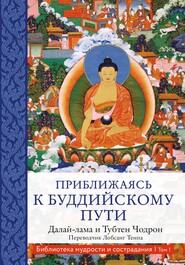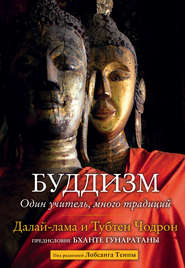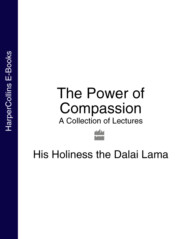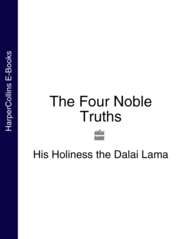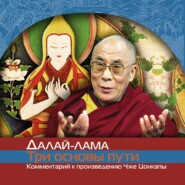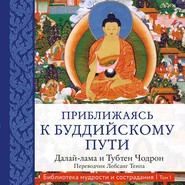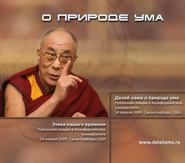По всем вопросам обращайтесь на: info@litportal.ru
(©) 2003-2024.
✖
The Dalai Lama’s Little Book of Wisdom
Автор
Год написания книги
2018
Настройки чтения
Размер шрифта
Высота строк
Поля
PART TWO FACING DEATH AND DYING (#ulink_70358b5e-122f-5122-814d-6cd8b9e42517)
The issue of facing death in a peaceful manner is a very difficult one. According to common sense, there seem to be two ways of dealing with the problem and the suffering. The first is simply to try to avoid the problem, to put it out of your mind, even though the reality of that problem is still there and it is not minimized. Another way of dealing with this issue is to look directly at the problem and analyse it, make it familiar to you and make it clear that it is a part of all our lives.
Illness happens. It is not something exceptional; it is part of nature and a fact of life. Of course we have every right to avoid illness and pain, but in spite of that effort, when illness happens it is better to accept it. While you should make every effort to cure it as soon as possible, you should have no extra mental burden. As the great Indian scholar Shantideva has said: ‘If there is a way to overcome the suffering, then there is no need to worry; if there is no way to overcome the suffering, then there is no use in worrying.’ That kind of rational attitude is quite useful.
Death is a part of all our lives. Whether we like it or not, it is bound to happen. Instead of avoiding thinking about it, it is better to understand its meaning. We all have the same body, the same human flesh, and therefore we will all die. There is a big difference, of course, between natural death and accidental death, but basically death will come sooner or later. If from the beginning your attitude is, ‘Yes, death is part of our lives’, then it may be easier to face.
There are two distinct approaches to dealing with a problem. One is to simply avoid it by not thinking about it. The other, which is much more effective, is to face it directly so that you are already conscious of it. Generally there are two types of problem or suffering: with one type, it is possible that, by adopting a certain attitude, one will be able to actually reduce the force and level of suffering and anxiety. However, there could be other types of problems and suffering for which adopting a certain type of attitude and way of thinking may not necessarily reduce the level of suffering, but which would still prepare you to face it.
When unfortunate things happen in our lives there are two possible results. One possibility is mental unrest, anxiety, fear, doubt, frustration and eventually depression, and, in the worst case, even suicide. That’s one way. The other possibility is that because of that tragic experience you become more realistic, you become closer to reality. With the power of investigation, the tragic experience may make you stronger and increase your selfconfidence and self-reliance. The unfortunate event can be a source of inner strength.
The success of our lives and our future depends on our motivation and determination or self-confidence. Through difficult experiences, life sometimes becomes more meaningful. If you look at people who, from the beginning of their lives, have had everything, you may see that when small things happen they soon lose hope or grow irritated. Others have developed stronger mental attitudes as a result of their hardships.
I think the person who has had more experience of hardships can stand more firmly in the face ofproblems than the person who has never experienced suffering. From this angle then, some suffering can be a good lesson for life.
Personally, I have lost my country and, worse still, in my country there has been a lot of destruction, suffering and unhappiness. I have spent not only the majority of my life but also the best part of my life outside Tibet. If you think of this from that angle alone, there is hardly anything that is positive. But from another angle, you can see that because of these unfortunate things I have had another type of freedom, such as the opportunity of meeting different people from different traditions and also of meeting scientists from different fields. From those experiences my life has been enriched and I have learned many valuable things. So my tragic experiences have also had some valuable aspects.
Looking at problems from different angles actually lessens the mental burden. From the Buddhist viewpoint, every event has many aspects and naturally one event can be viewed from many, many different angles. It is very rare or almost impossible that an event can be negative from all points of view. Therefore, it is useful when something happens to try to look at it from different angles and then you can see the positive or beneficial aspects. Moreover, if something happens, it is very useful immediately to make a comparison with some other event or with the events of other peopleor other nations. This is also very helpful in sustaining your peace of mind.
I will now explain, as a Buddhist monk, how to deal with death. Buddha taught the principles of the Four Noble Truths, the first of which is the Truth of Suffering. The Truth of Suffering is taught within the context of three characteristics of existence, the first being impermanence. When talking about the nature of impermanence we must bear in mind that there are two levels. One is the coarse level, which is quite obvious and is the cessation of the continuation of a life or an event. But the impermanent nature which is being taught in relation to the Four Noble Truths refers to the more subtle aspect of impermanence, which is the transitory nature of existence.
By reflecting on the coarser levels of impermanence one will be able to confront and counteract grasping at permanence or eternal existence of one’s own identity or self, because it is grasping at permanence that forces us to cling onto this very ‘now-ness’ or matters of one’s lifetime alone. By releasing the grip of this grasping and enduring within us, we will be in a better position to appreciate the value of working for our future lifetimes.
One of the reasons why awareness of death and impermanence is so crucial in the Buddhist religious practice is that it is considered that your state of mind at the time of death has a very great effect on determining what form of rebirth you might take. Whether it is a positive state of mind or a negative one will have a great effect. Therefore, Buddhist religious practice greatly emphasizes the importance of the awareness of death and impermanence.
One of the positive side-effects of maintaining a very high degree of awareness of death is that it will prepare the individual to such an extent that, when the individual actually faces death, he or she will be in a better position to maintain his or her presence of mind. Especially in Tantric Buddhism, it is considered that the state of mind which one experiences at the point of death is extremely subtle and, because of the subtlety of the level of that consciousness, it also has a great power and impact upon one’s mental continuum.
In Tantric practices we find a lot of emphasis placed on reflections upon the process of death, so that the individual at the time of death not only retains his or her presence of mind, but also is in a position to utilize that subtle state of consciousness effectively towards the realization of the path.
From the Tantric perspective, the entire process of existence is explained in terms of the three stages known as ‘death’, the ‘intermediate state’ and ‘rebirth’. All of these three stages of existence are seen as states or manifestations of the consciousness and the energies that accompany or propel the consciousness, so that the intermediate state and rebirth are nothing other than various levels of the subtle consciousness and energy. An example of such fluctuating states can be found in our daily existence, when during the 24-hour day we go through a cycle of deep sleep, the waking period and the dream state. Our daily existence is in fact characterized by these three stages.
As death becomes something familiar to you, as you have some knowledge of its processes and can recognize its external and internal indications, you are prepared for it. According to my own experience, I still have no confidence that at the moment of death I will really implement all these practices for which I have prepared. I have no guarantee!
Sometimes when I think about death I get some kind of excitement. Instead of fear, I have a feeling of curiosity and this makes it much easier for me to accept death. Of course, my only burden if I die today is, ‘Oh, what will happen to Tibet? What about Tibetan culture? What about the six million Tibetan people’s rights?’ This is my main concern. Otherwise, I feel almost no fear of death.
In my daily practice of prayer I visualize eight different deity yogas and eight different deaths. Perhaps when death comes all my preparation may fail. I hope not! I think these practices are mentally very helpful in dealing with death. Even if there is no next life, there is some benefit if they relieve fear. And because there is less fear, one can be more fully prepared. If you are fully prepared then, at the moment of death, you can retain your peace of mind.
I think at the time of death a peaceful mind is essential no matter what you believe in, whether it is Buddhism or some other religion. At the moment of death, the individual should not seek to develop anger, hatred and so on. I think even non-believers see that it is better to pass away in a peaceful manner, it is much happier. Also, for those who believe in heaven or some other concept, it is also best to pass away peacefully with the thought of one’s own God or belief in higher forces. For Buddhists and also other ancient Indian traditions, which accept the rebirth or karma theory, naturally at the time of death a virtuous state of mind is beneficial.
PART THREE DEALING WITH ANGER AND EMOTION (#ulink_a10e9f86-5457-57cd-9251-e35b53e505de)
Anger and hatred are two of our closest friends. When I was young I had quite a close relationship with anger. Then eventually I found a lot of disagreement with anger. By using common sense, with the help of compassion and wisdom, I now have a more powerful argument with which to defeat anger.
Perhaps there are two types of anger. One type of anger could be transformed into a positive emotion. For example, if one has a sincere compassionate motivation and concern for someone and that person does not heed one’s warning about his or her actions, then there is no alternative except the use of some kind of force to stop that person’s misdeeds.
According to my experience, it is clear that if each individual makes an effort then he or she can change. Of course, change is not immediate and it takes a lot of time. In order to change and deal with emotions it is crucial to analyse which thoughts are useful, constructive and of benefit to us. I mean mainly those thoughts which make us calmer, more relaxed and which give us peace of mind, versus those thoughts which create uneasiness, fear and frustration.
Within the body there are billions of different particles. Similarly, there are many different thoughts and a variety of states of mind. It is wise to take a close look into the world of your mind and to make the distinction between beneficial and harmful states of mind. Once you can recognize the value of good states of mind, you can increase or foster them.
Buddha taught the principles of the Four Noble Truths and these form the foundation of the Buddha Dharma. The Third Noble Truth is cessation. In this context cessation means the state of mind or mental quality which, through practice and effort, ceases all the negative emotions. It is a state in which the individual has reached a perfected state of mind which is free from the effects of various afflictive and negative emotions and thoughts.
The state of true cessation is, according to Buddhism, the refuge that all practising Buddhists seek. The reason one seeks refuge in the Buddha, is not because Buddha was from the beginning a special person, but because Buddha realized the state of true cessation.
Generally speaking, in Buddhist literature, a negative emotion or thought is defined as ‘a state which causes disturbance within one’s mind’. These afflictive emotions and thoughts are factors that create unhappiness and turmoil within us. Emotion in general is not necessarily something negative. At a scientific conference which I attended along with many psychologists and neuro-scientists, it was concluded that even Buddhas have emotion, according to the definition of emotion found in various scientific disciplines. So karuna (infinite compassion or kindness) can be described as a kind of emotion.
Naturally emotions can be positive and negative. However, when talking about anger, etc., we are deal-ing with negative emotions. Negative emotions are those which immediately create some kind of unhappiness or uneasiness and which, in the long run, create certain actions. Those actions ultimately lead to harm to others and this brings pain or suffering to oneself. This is what we mean by negative emotions.
In Tantric practice there are meditative techniques which enable the transformation of the energy of anger. This is the reason behind the wrathful deities. On the basis of compassionate motivation, anger may in some cases be useful because it gives us extra energy and enables us to act swiftly. However, anger usually leads to hatred and hatred is always negative. Hatred harbours ill will.
I usually analyse anger on two levels: on the basic human level and on the Buddhist level. From the human level, without any reference to a religious tradition or ideology, we can look at the sources of our happiness: good health, material facilities and good companions. Now from the stand-point of health, negative emotions such as hatred are very bad.
Your mental state should always remain calm. Even if some anxiety occurs, as it is bound to in life, you should always be calm. Like a wave, which rises from the water and dissolves back into the water, these disturbances are very short, so they should not affect your basic mental attitude. If you remain calm your blood pressure and so on remains more normal and as a result your health will improve.
Some of my close friends have high blood pressure, yet they never come near to having crises in their health and they never feel tired. Over the years I have met some very good practitioners. Meanwhile, there are other friends who have great material comfort yet, when we start to talk, after the initial few nice words, they begin to complain and grieve. In spite of their material prosperity, these people do not have calm or peaceful minds. As a result, they are always wor-rying about their digestion, their sleep, everything! Therefore it is clear that mental calmness is a very important factor for good health.
The second source of happiness comes from our ma-terial facilities. Sometimes when I wake up in the early morning, if my mood is not very good, then when I look at my watch I feel uncomfortable because of my mood. Then on other days, due perhaps to the previous day’s experience, when I wake up my mood is pleasant and peaceful. At that time, when I look at my watch I see it as extraordinarily beautiful. Yet it is the same watch, isn’t it? The difference comes from mental attitude. Whether our use of our material facilities provides genuine satisfaction or not depends on our mental attitude.
It is bad for our material possessions if our mind is dominated by anger. To speak again from my own experience, when I was young I sometimes repaired watches. I tried and failed many times. Sometimes I would lose my patience and hit the watch! During those moments, my anger altered my whole attitude and afterwards I felt very sorry for my actions. If my goal was to repair the watch, then why did I hit it on the table? Again you can see how one’s mental attitude is crucial in order to utilize material facilities for one’s own genuine satisfaction or benefit.
The third source of happiness is our companions. It is obvious that when you are mentally calm you are honest and open-minded. Even if there is a big difference of opinion, you can communicate on a human level. You can put aside these different opinions and communicate as human beings. I think that is one way to create positive feelings in other people’s minds.
I think that there is more value in genuine human feeling than in status and so on. I am just a simple human being. Through my experience and mental discipline, a certain new attitude has developed. This is nothing special. You, who I think have had a better education and more experience than myself, have more potential to change within yourself. I come from a small village with no modern education and no deep awareness of the world. Also, from the age of 15 or 16 I had an unthinkable sort of burden.
Each of you should feel that you have great potential and that, with self-confidence and a little more effort, change really is possible if you want it. If you feel that your present way of life is unpleasant or has some difficulties, then don’t look at these negative things. See the positive side, the potential, and make an effort.
So, as far as our contact with fellow human beings is concerned, our mental attitude is very crucial. Even for a non-believer, just a simple honest being, the ultimate source of happiness is in our mental attitude. Even if you have good health, material facilities used in the proper way and good relations with other human beings, the main cause of a happy life is within.
Now you can see how to minimize anger and hatred. First, it is extremely important to realize the negativeness of these emotions in general, particularly hatred. I consider hatred to be the ultimate enemy. By ‘enemy’ I mean the person or factor which directly or indirectly destroys our interest. Our interest is that which ultimately creates happiness.
We can also speak of the external enemy. For example, in my own case, our Chinese brothers and sisters are destroying Tibetan rights and, in that way, more suffering and anxiety develops. But no matter how forceful this is, it cannot destroy the supreme source of my happiness, which is my calmness of mind. This is something an external enemy cannot destroy. Our country can be invaded, our possessions can be destroyed, our friends can be killed, but these are secondary for our mental happiness. The ultimate source of my mental happiness is my peace of mind. Nothing can destroy this except my own anger.
Moreover, you can escape or hide from an external enemy and sometimes you can even cheat the enemy. For example, if there is someone who disturbs my peace of my mind, I can escape by locking my door and sitting quietly alone. But I cannot do that with anger! Wherever I go, it is always there. Even though I have locked my room, the anger is still inside. Unless you adopt a certain method, there is no possibility of escape. Therefore, hatred or anger – and here I mean negative anger – is ultimately the real destroyer of my peace of mind and is therefore my true enemy.
Some people believe that to suppress emotions is not good, that it is much better to let it out. I think there are differences between various negative emotions. For example, with frustration, there is a certain frustration which develops as a result of past events. Sometimes if you hide these negative events, such as sexual abuse, then consciously or unconsciously this creates problems. Therefore, in this case it is much better to express the frustration and let it out.
However, according to our experience with anger, if you do not make an attempt to reduce it, it will remain with you and even increase. Then even with small incidents you will immediately get angry. Once you try to control or discipline your anger, then eventually even big events will not cause anger.
When anger comes there is one important technique to help you keep your peace of mind. You should not become dissatisfied or frustrated, because this is the cause of anger and hatred. There is a natural connection between cause and effect. Once certain causes and conditions are fully met it is extremely difficult to prevent that causal process from coming to fruition. It is crucial to examine the situation so that at a very early stage one is able to put a stop to the causal process. Then it does not continue to an advanced stage.
In the Buddhist text A Guide to the Bodhisattva Way of Life, the great scholar Shantideva mentions that it is very important to ensure that a person does not get into a situation which leads to dissatisfaction, because dissatisfaction is the seed of anger. This means that one must adopt a certain outlook towards one’s material possessions, towards one’s companions and friends, and towards various situations.
Our feelings of dissatisfaction, unhappiness, loss of hope and so forth are in fact related to all phenomena. If we do not adopt the right outlook, it is possible that anything and everything could cause us frustration. Yet phenomena are part of reality and we are subject to the laws of existence. So this leaves us only one option: to change our own attitude. By bringing about a change in our outlook towards things and events, all phenomena can become friends or sources of happiness, instead of becoming enemies or sources of frustration.
In one way, having an enemy is very bad. It disturbs our mental peace and destroys some of our good things. But if we look at it from another angle, only an enemy gives us the opportunity to practise patience. No one else provides us with the opportunity for tolerance. Since we do not know the majority of the five billion human beings on this earth, therefore the majority of people do not give us an opportunity to show tolerance or patience either. Only those people whom we know and who create problems for us really provide us with a good opportunity to practise tolerance and patience.
Shantideva says that it is the very intention of harming us which makes the enemy very special. If the enemy had no intention of harming us, then we would not classify that person as an enemy, therefore our attitude would be completely different. It is his or her very intention of harming us which makes that person an enemy and because of that the enemy provides us with an opportunity to practise tolerance and patience. Therefore an enemy is indeed a precious teacher. By thinking along these lines you can eventually reduce the negative mental emotions, particularly hatred.
Another question is that if you always remain humble then others may take advantage of you and how should you react? It is quite simple: you should act with wisdom or common sense, without anger and hatred. If the situation is such that you need some sort of action on your part, you can, without anger, take a counter- measure. In fact, such actions which follow true wisdom rather than anger are in reality more effective. A counter-measure taken in the midst of anger may often go wrong. Without anger and without hatred, we can manage more effectively.







